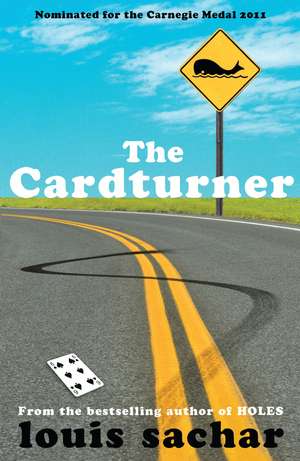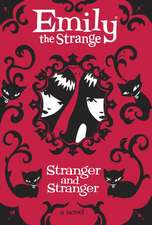The Cardturner
Autor Louis Sacharen Limba Engleză Paperback – 8 aug 2011 – vârsta de la 12 ani
| Toate formatele și edițiile | Preț | Express |
|---|---|---|
| Paperback (2) | 40.04 lei 3-5 săpt. | +21.57 lei 4-10 zile |
| Bloomsbury Publishing – 8 aug 2011 | 40.04 lei 3-5 săpt. | +21.57 lei 4-10 zile |
| Ember – 30 sep 2011 | 73.97 lei 3-5 săpt. |
Preț: 40.04 lei
Preț vechi: 51.57 lei
-22% Nou
Puncte Express: 60
Preț estimativ în valută:
7.66€ • 8.32$ • 6.44£
7.66€ • 8.32$ • 6.44£
Carte disponibilă
Livrare economică 01-15 aprilie
Livrare express 15-21 martie pentru 31.56 lei
Preluare comenzi: 021 569.72.76
Specificații
ISBN-13: 9781408808511
ISBN-10: 140880851X
Pagini: 352
Dimensiuni: 129 x 198 x 22 mm
Greutate: 0.24 kg
Editura: Bloomsbury Publishing
Colecția Bloomsbury Children's Books
Locul publicării:London, United Kingdom
ISBN-10: 140880851X
Pagini: 352
Dimensiuni: 129 x 198 x 22 mm
Greutate: 0.24 kg
Editura: Bloomsbury Publishing
Colecția Bloomsbury Children's Books
Locul publicării:London, United Kingdom
Caracteristici
Louis Sachar's first new novel since Small Steps will delight all his fans and introduce a different readership to his wonderful books
Notă biografică
Louis Sachar is the author of the award-winning international bestseller Holes, which was made into a film in 2003. All of Louis's books for children have been published in the UK by Bloomsbury. These also include Small Steps, Stanley Yelnats' Survival Guide to Camp Green Lake, Dogs Don't Tell Jokes, There's a Boy in the Girls' Bathroom, Someday Angeline, and the Marvin Redpost series and Wayside School books. He is the recipient of many of the world's best regarded book prizes, including the National Book Award and the Newbery Medal. Louis Sachar lives in Austin, Texas, with his wife, daughter and two dogs.
Recenzii
Louis Sachar is one of the few masters of American fiction
This is Sachar, owner of the most distinctive, clever, funny, philosophical voice in children's fiction . . . a whale symbol on the page warns of forthcoming bridge analysis, which the readers can skip if they want. But they probably won't. Because this is Sachar
In Alton Richards, Sachar has created a credible and funny teenage lead . . . The human drama is gripping
The genius of Sachar's prose is that it's so plain and unshowy you don't notice the daredevil artistry of his storytelling until it's too late. You don't know you've been cut in half until you try to walk away . . . As Uncle Lester might say, nicely played, Louis
This is Sachar, owner of the most distinctive, clever, funny, philosophical voice in children's fiction . . . a whale symbol on the page warns of forthcoming bridge analysis, which the readers can skip if they want. But they probably won't. Because this is Sachar
In Alton Richards, Sachar has created a credible and funny teenage lead . . . The human drama is gripping
The genius of Sachar's prose is that it's so plain and unshowy you don't notice the daredevil artistry of his storytelling until it's too late. You don't know you've been cut in half until you try to walk away . . . As Uncle Lester might say, nicely played, Louis
Descriere
A 17-year-old boy, a rich blind uncle, an attractive girl and a mother who is looking forward to an inheritance create a heady and exciting cocktail of opportunity
This brand new novel from the bestselling author of Holes, is nominated for the Carnegie Medal 2011
This brand new novel from the bestselling author of Holes, is nominated for the Carnegie Medal 2011
Extras
1
My Favorite Uncle
Ever since I was a little kid, I've had it drilled into me that my uncle Lester was my favorite uncle. My mother would thrust the phone at me and say, "Uncle Lester wants to talk to you," her voice infused with the same forced enthusiasm she used to describe the deliciousness of canned peas. "Tell him you love him."
"I love you, Uncle Lester," I'd say.
"Tell him he's your favorite uncle."
"You're my favorite uncle."
It got worse as I got older. I never knew what to say to him, and he never seemed all that interested in talking to me. When I became a teenager I felt silly telling him he was my favorite uncle, although my mother still urged me to do so. I'd say things like "Hey, how's it goin'?" and he'd grunt some response. He might ask me a question about school. I imagine it was a great relief to both of us when my mother took back the phone. Our brief conversations always left me feeling embarrassed, and just a little bit creepy.
He was actually my great-uncle, having been my mother's favorite uncle long before he was mine.
I didn't know how much money he had, but he was rich enough that he never had to be nice to anyone. Our favorite uncle never visited us, and I think my mother initiated all the phone conversations with him. Later, after he got really sick, he wouldn't even talk to her. My mother would call almost daily, but she could never get past his housekeeper. I had only met Uncle Lester face to face one time, at his sixty-fifth birthday party. I was six years old, and to me, his house seemed like a castle on a mountaintop. I said the obligatory "Happy birthday" and "I love you" and "You're my favorite uncle" and then steered clear of him.
"His heart is as cold as a brick," my father said on the drive home.
That phrase has stuck with me, I think, because my father used the word cold instead of hard.
My elementary school was a brick building. Every day on the way home, I would drag my fingers over the hard, and yes, cold surface.
I'm in high school now, but still whenever I walk by a brick building, I feel compelled to touch it. Even now, as I write this, I can almost feel the hard coolness, the sharp edges, and the roughness of the cement between the bricks.
From the Hardcover edition.
My Favorite Uncle
Ever since I was a little kid, I've had it drilled into me that my uncle Lester was my favorite uncle. My mother would thrust the phone at me and say, "Uncle Lester wants to talk to you," her voice infused with the same forced enthusiasm she used to describe the deliciousness of canned peas. "Tell him you love him."
"I love you, Uncle Lester," I'd say.
"Tell him he's your favorite uncle."
"You're my favorite uncle."
It got worse as I got older. I never knew what to say to him, and he never seemed all that interested in talking to me. When I became a teenager I felt silly telling him he was my favorite uncle, although my mother still urged me to do so. I'd say things like "Hey, how's it goin'?" and he'd grunt some response. He might ask me a question about school. I imagine it was a great relief to both of us when my mother took back the phone. Our brief conversations always left me feeling embarrassed, and just a little bit creepy.
He was actually my great-uncle, having been my mother's favorite uncle long before he was mine.
I didn't know how much money he had, but he was rich enough that he never had to be nice to anyone. Our favorite uncle never visited us, and I think my mother initiated all the phone conversations with him. Later, after he got really sick, he wouldn't even talk to her. My mother would call almost daily, but she could never get past his housekeeper. I had only met Uncle Lester face to face one time, at his sixty-fifth birthday party. I was six years old, and to me, his house seemed like a castle on a mountaintop. I said the obligatory "Happy birthday" and "I love you" and "You're my favorite uncle" and then steered clear of him.
"His heart is as cold as a brick," my father said on the drive home.
That phrase has stuck with me, I think, because my father used the word cold instead of hard.
My elementary school was a brick building. Every day on the way home, I would drag my fingers over the hard, and yes, cold surface.
I'm in high school now, but still whenever I walk by a brick building, I feel compelled to touch it. Even now, as I write this, I can almost feel the hard coolness, the sharp edges, and the roughness of the cement between the bricks.
From the Hardcover edition.






